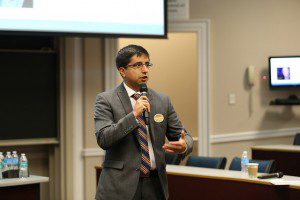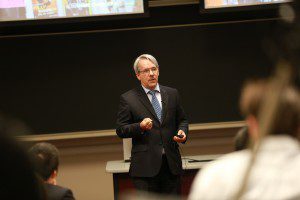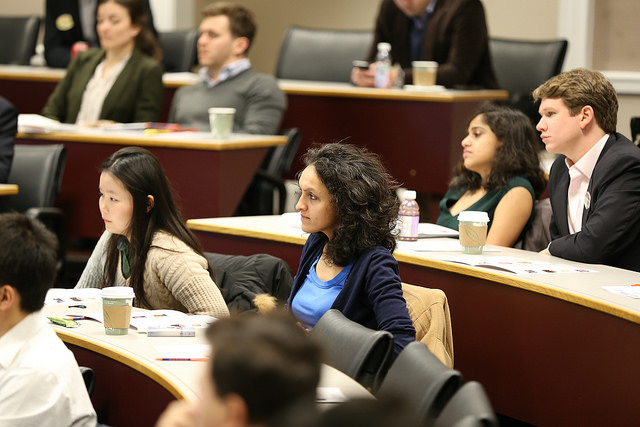

By Sara Lettie
The 3rd annual Darden Global Conference took place on 19 February and packed Classroom 50. Hosted by the Darden International Business Society and other international affinity clubs and sponsored by the Darden Center for Global Initiatives, keynote speakers, Alfredo Torres and Mark Templeton (MBA ’78), discussed the challenges of doing business in emerging markets. The conference theme, Doing Business in a Changing World, highlighted differing perspectives from CEOs, economists, and globally experienced leaders. They all spoke about not only the benefits of doing business globally, but also the unique challenges.
Yolanda Fan (Class of 2016), one of the Global Conference’s primary organizers, said “there are already tons of ways to have a global experience at Darden– from cases on different economies or MNC practices, to Global Business Experience visits abroad or Global Consulting Projects. As a student club, we want to show our own initiatives and to offer a platform for students to hear from global executives and reflect their own global perspectives. As a SY student, I know many of us aspire to have a global career at some point of our lives. I hope hearing from the inspiring guest speakers better prepares us to lead with a true global mindset.”
Darden’s Dean, Scott Beardsley, opened the conference with a short introduction to current trends in global markets. Beardsley also acknowledged the importance of diverse dialogues and welcomed the new Darden’s newly appointed Global Chief Diversity Officer, Melissa Thomas–Hunt, who will help boost diversity and global engagement at Darden.

As the CEO of Ipsos Peru and Ipsos Public Affairs Latam, Alfredo Torres offered insight into Latin America, outlining relative economic standing, level of competitiveness, and demographics of unique countries and identifying common business characteristics across the region. Ultimately, the biggest challenge Latin America faces is insufficient institutions – social, political, and economic. This lack of institutional stability creates distrust among the people, corruption, unemployment and poverty which all leads to a large informal sector. When asked ‘where is Latin America going?’ Torres predicted the more diversified economies will succeed but does not foresee significant growth without proper institutions in place.
Panelists Ricardo Jimenez, Andre Street, and Jerry Peng (MBA ’03) used personal experience to offer their expertise on investing and doing business in global markets. Working mainly in Brazil, Street understands the risk of investing in Latin America and advises future business leaders to make sure their long term goals align with the type of people they will end up working with. “Think about a bridge, you need to find something common on both ends” agreed Peng, describing the importance of partnerships when working in emerging markets, also taking a long-term perspective. Jimenez also viewed relationships as a challenge of doing business in Latin America but through a different perspective. He perceived the hardship of partnerships in an emerging market difficult because of the uncertainty. Raising money in order to invest is difficult because people need more security in case of a downward turn. Therefore, businesses must be able to protect their investments. All panelists discussed the importance of cross-cultural relationships with a unique perspective on the challenges of effective risk management and communication.
The second panel of the day, “Turbulence and Outlook” moderated by Professor and Academic Director of Darden’s Asia Initiative, Dennis Yang, shifted focus and looked closely at China and India with Nicholas R. Lardy and William Antholis. Lardy, a senior fellow at the Peterson Institute for International Economics, described the economy of China and its relation to the global market. Although China’s contribution to global growth will decrease, the potential for future growth is eminent due to the Chinese asymmetrical liberalization. For example, the telecommunications sector will need to open to the public which will increase the profitability and competitiveness of the firms. Antholis, Director & CEO of U.Va.’s Miller Center, proposed a comparative analysis between China and India, regarding specific attributes that affect economic development. Through these brief but informative conversations the audience was able to see other challenges to doing business in a global market.
Lastly Mark Templeton (MBA ’78) took the floor as the closing keynote speaker on New Globalization. As the former President & CEO of Citrix, Templeton offered a broader perspective to becoming a global citizen. In order to build a foundation across borders, Templeton defined his four main challenges to globalizing business: American exceptionalism, centralization vs. decentralization, systems, pricing & go-to-market decisions, and language skills as a proxy for business acumen. In his closing remarks, Templeton offered a final word of advice to the future business leaders – dive into the culture and fabric of a country before you dive into business. The main takeaway from his presentation was to look at the local culture and values if you want to effectively globalize your business.
So, what did you get out of this? And how can this information benefit your future career?
Pratik Shrestha (Class of 2017) shared his thoughts and takeaways from the 3rd annual Darden Global Conference: “I enjoyed all of the speakers. The breadth and depth of China and India discussion was really interesting. All of the content and conversations will be really helpful to me as I think about and take companies global in the future.”
Read more about the Darden Global Conference in this press release about the event.





